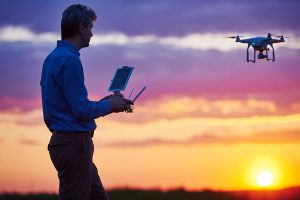You Can Sue A Drone Operator For Surveillance
 Michael Babboni
Personal Injury
One of the more unusual technologies to become declassified and trickle down into general consumer use in the 21st century is unmanned aerial system, better known as a “drone.” These remotely operated flying vehicles were once highly protected military secrets that were used in everything from targeting terrorists to providing military intelligence for plotting an attack strategy. Today, anyone can buy a drone and, after registering it, let it fly through the sky either for recreation, or for commercial purposes.
Michael Babboni
Personal Injury
One of the more unusual technologies to become declassified and trickle down into general consumer use in the 21st century is unmanned aerial system, better known as a “drone.” These remotely operated flying vehicles were once highly protected military secrets that were used in everything from targeting terrorists to providing military intelligence for plotting an attack strategy. Today, anyone can buy a drone and, after registering it, let it fly through the sky either for recreation, or for commercial purposes.And while it can be fun to fly a drone for the sheer joy of it, there are certainly are many commercial applications, not the least of which is photography. The ability of the drone to fly in any direction in a steady, stable manner has made it a boon to the photography and cinematography industries. What once required incredibly expensive cranes to hold a camera steady enough to get a high altitude shot can now be done with drones equipped with cameras at a fraction of the cost of a high budget Hollywood production.
This ability of drones to take sharp, steady pictures has been used in everything from shooting high quality real estate videos for the promotion of a home on sale, to artful or dynamic photography of performances and sporting events. But it also means they are prone to a unique kind of abuse.
The Invasion Of Privacy Is Real
It should come as no surprise that since one of the original military functions of drones was intelligence gathering and reconnaissance, spying in the civilian world is one way to exploit a drone. Drones are small, light, relatively quiet, and, unless you’re using night vision goggles, nearly impossible to spot at night. Using a drone to spy on people is illegal, but of course, some people ignore the law and use drones in just such a manner.
If you find that a drone is watching over you and/or your home, you can actually sue for damages and personal injury over this. However, the intent to use a drone for deliberate surveillance purposes must be proven in court in order for the case to be won. So while a single drone randomly hovering over your backyard while you and your family enjoy swimming might not be disconcerting, it’s not enough to track down the owner and give notice of your intent to sue.
On the other hand, if you find a drone following you while you drive, all the way back to your home, or you see the same drone hovering near your home, focusing on the windows several days in a row, you have a clear cut case.
Every drone that is in use must have a registration number somewhere on it in order to identify the owner. If you can find that number, you’re taking your first step towards taking the spy operating the drone to court. Illegal surveillance is very serious, and it can be injurious to person on many levels. A personal injury lawyer in St. Petersburg can be an important ally in settling such a case, and getting justice from the person that decided to invade your privacy.
